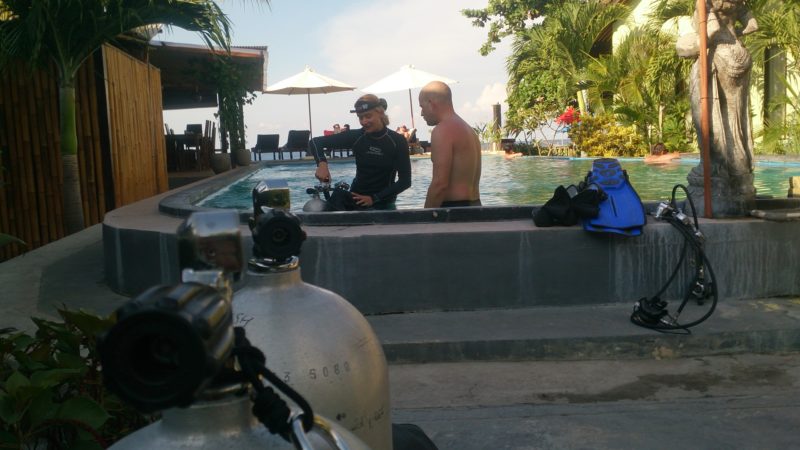The phrase “technical diving” often evokes images of divers carrying several tanks and lots of additional gear. These heavily laden, heavily experienced divers head off into deep waters towards challenging shipwrecks, or into caves. And while some of these images are truly awe-inspiring, technical diving for beginners can be much simpler. Here we’ll feature some entry-level tech diving courses and explain who’s a good fit for each. You might be surprised just how early on in your diving life you can get a taste for tech.
Where do future technical divers start? Initially, it’s all about getting to know tech equipment and improving foundational diving skills — most of all buoyancy control and awareness underwater.
Technical diving courses for beginners
Like recreational divers who join ‘try dives,’ many technical divers catch the bug during a tech trial. The dive center or the instructor offering the course determine what the trial involves. Options range from a short equipment trial in a swimming pool to a full one-day program. PADI has formalized this trial as Discover Tec, which involves a single dive, either in confined water or limited open water. In no more than 32 feet (10 m), divers can try out twinsets, side-mount equipment or single tanks fitted with an H or Y valve. Discover Tec is open to Open Water divers, with an option to complete technical diving skills on the dive as well. Those who fulfill all the prerequisites can receive credit toward PADI’s Tec 40 course.
TDI Intro to Tech
Those looking for a more in-depth introduction to technical diving principles should try TDI’s Intro to Tech. Over the course of three dives, conducted to a maximum depth of 75 feet (23 m), divers learn various kicking techniques, including a backward kick and helicopter turns. They learn to prepare tech-diving equipment, usually twinsets, and — in the water — focus on perfecting buoyancy. Next, they’ll practice twinset-valve shutdown drills in preparation for emergencies. The class works to lay a solid foundation for future decompression diving. Students will also spend time in the classroom or completing online learning, which focuses on principles of gas planning as well as physics and physiology for diving.
Intro to Tech is open to Open Water divers with a minimum of 25 logged dives. Divers can be as young as 15 years old, providing they have parental consent. Divers must have attained Advanced Open Water certification for PADI’s Tec Basics specialty. This distinctive specialty covers the first 50 percent of the PADI Tec 40 course. As well as being a way to introduce teenagers to the world of technical diving, Tec Basics is a good option for those who don’t have three to four days to complete the full course.
Similarly, SSI offers Extended Range Foundations for divers who want to hone existing skills and improve them in confined water. Dives only go to a maximum of 39 feet (12 m). Participants must be Open Water divers and nitrox certified before embarking on this course.
In-depth courses
Arguably the most in-depth basic technical diving course is GUE Fundamentals, conducted by Global Underwater Explorers. The course usually takes four days and includes six dives to a maximum depth of 59 feet (18 m). GUE offers a recreational and a technical version of their Fundamentals. Both versions start with a timed swim test. Next, divers progress through advanced buoyancy-control skills, such as staying within 3 feet (1 m) of a target depth to no-visibility communication methods like touch contact. Divers consider “Fundies” one of the more challenging introductions to technical diving. Open Water Divers of at least 16 years of age ca participate, but it’s most appropriate for those who are already fairly sure that they’ll enjoy technical diving and are happy to commit to GUE’s strict equipment configuration requirements.
Trying technical diving doesn’t have to break the bank or take up a diver’s whole vacation. Most training agencies have introductory technical diving classes on offer no matter if you’re at home or on vacation. Two or three days are often enough to get a taste of what’s involved when it comes to equipment requirements, diving skills, time needed to progress and, of course, the increased risk involved in diving beyond recreational diving limits.




